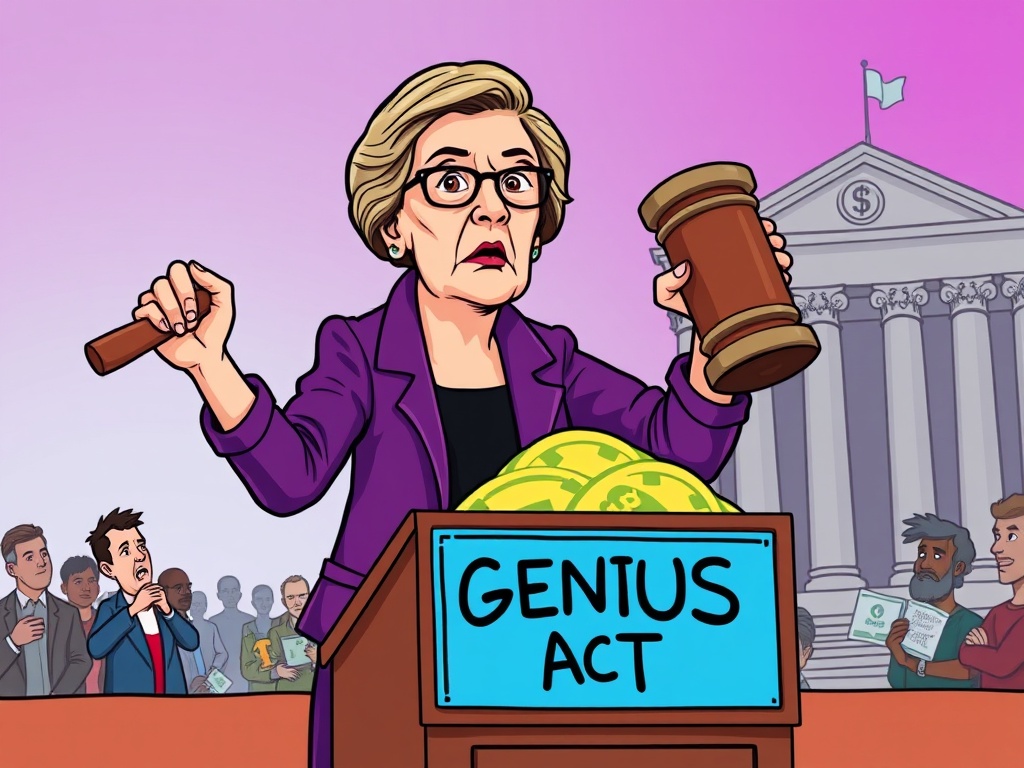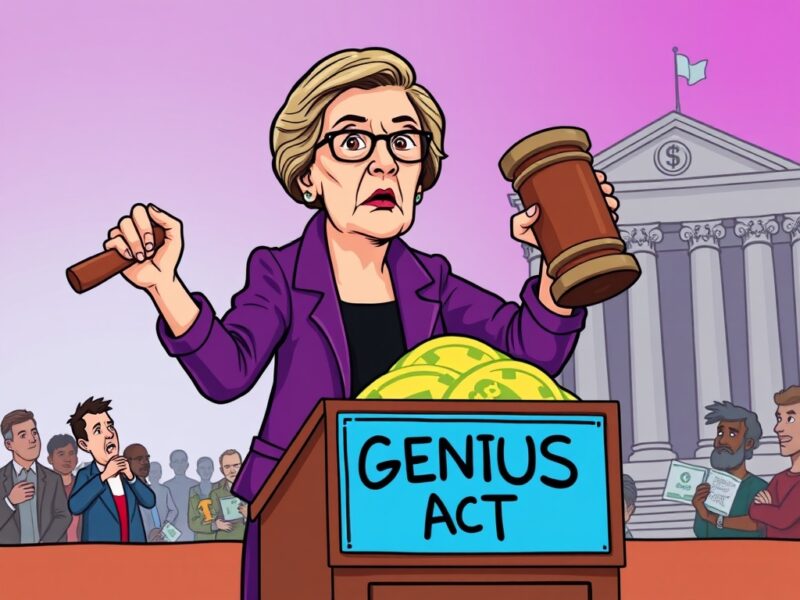BitcoinWorld

Crypto Regulation Under Fire: Senator Warren’s Alarming Critique of the GENIUS Act
The world of digital assets is constantly evolving, and with it, the urgent debate around how best to govern this burgeoning financial frontier. At the heart of this discussion lies the critical need for robust crypto regulation that protects consumers and maintains financial stability. Recently, this debate intensified as U.S. Senator Elizabeth Warren, a prominent voice for consumer protection, delivered a scathing critique of the newly enacted GENIUS Act, warning that its industry-driven nature could leave the American public vulnerable. Her concerns underscore a fundamental tension: how to foster innovation while safeguarding against systemic risks in the rapidly expanding cryptocurrency ecosystem.
What’s the Fuss About the GENIUS Act and Crypto Regulation?
Senator Warren’s strong words, shared in an interview with Vanity Fair and reported by Decrypt, highlight a deep-seated apprehension regarding the GENIUS Act. While she acknowledges the undeniable necessity for comprehensive crypto regulation, her core contention is that this particular piece of legislation was heavily influenced by intense lobbying from the cryptocurrency industry itself. In her view, this effectively allowed the very sector that needs oversight to dictate the terms of its own governance.
Think of it this way: imagine a scenario where the companies being regulated get to write the rulebook. Senator Warren suggests that this is precisely what has transpired with the GENIUS Act, raising serious questions about its impartiality and effectiveness in truly protecting the public interest. This isn’t just a theoretical concern; it draws on historical precedents that have had profound and painful consequences for the American economy.
Echoes of the Past: Is History Repeating Itself in Crypto Regulation?
One of Senator Warren’s most striking comparisons links the GENIUS Act to the Commodity Futures Modernization Act of 2000 (CFMA). For those unfamiliar, the CFMA was a landmark piece of legislation that largely deregulated over-the-counter derivatives, including credit default swaps. Warren contends that this deregulation played a significant role in setting the stage for the devastating 2008 global financial crisis.
Her argument is clear: by allowing a financial sector to operate with minimal oversight, especially one as complex and interconnected as derivatives or, in this case, cryptocurrencies, you invite systemic risk. The fear is that the GENIUS Act, by granting the crypto industry too much autonomy in shaping its own crypto regulation framework, could lead to similar vulnerabilities, potentially leaving taxpayers and the broader economy to “pay the price” for future market instability or collapse.
The Perilous Promise of Stablecoins: A Misleading Presumption of Safety?
A specific area of concern for Senator Warren is how the GENIUS Act treats stablecoins. Stablecoins are cryptocurrencies designed to maintain a stable value, typically by being pegged to a fiat currency like the U.S. dollar, or to a commodity like gold. They are often seen as a less volatile bridge between traditional finance and the crypto world, facilitating transactions and providing liquidity.
However, Warren worries that the GENIUS Act bestows a “misleading presumption of safety” upon stablecoins. This implies that the bill might not sufficiently scrutinize the reserves backing these stablecoins, or the mechanisms by which they maintain their peg. If these reserves are insufficient, illiquid, or poorly managed, a stablecoin could “break the peg,” leading to significant losses for holders and potentially triggering wider market panic. Such an event could:
- Erode Consumer Trust: If a stablecoin collapses, it could shatter public confidence in the broader cryptocurrency market, hindering legitimate innovation.
- Trigger Bank Runs: Warren specifically warns that inadequate stablecoin regulation could increase the risk of future bank runs. If stablecoin issuers hold traditional assets in banks, and a large redemption event occurs, it could put immense pressure on those banking institutions, potentially leading to liquidity crises.
- Create Systemic Risk: As stablecoins become more integrated into the financial system, their failure could have ripple effects, impacting traditional markets and financial institutions.
This concern is not new; the collapse of TerraUSD (UST) in May 2022, an algorithmic stablecoin that lost its dollar peg and wiped out billions in value, served as a stark reminder of the inherent risks when crypto regulation is absent or insufficient.
Navigating the Complex Landscape of Crypto Regulation: What’s at Stake?
The debate surrounding the GENIUS Act and Senator Warren’s criticism underscores the immense challenges in crafting effective crypto regulation. On one hand, proponents of a lighter regulatory touch argue that excessive rules could stifle innovation, push crypto activities offshore, and prevent the U.S. from maintaining its leadership in this emerging technology. They often emphasize the decentralized nature of crypto and the potential for new financial paradigms.
On the other hand, regulators like Senator Warren emphasize the paramount importance of consumer protection, financial stability, and preventing illicit activities. They argue that without robust oversight, the crypto market remains a Wild West, ripe for fraud, manipulation, and systemic risks that could eventually spill over into the traditional economy. The goal, from this perspective, is not to halt innovation but to channel it responsibly within a secure framework.
Key Considerations for Effective Crypto Regulation:
Crafting balanced crypto regulation requires careful consideration of several factors:
- Defining Crypto Assets: Are they securities, commodities, or something else entirely? Clear definitions are crucial for determining which regulatory bodies have jurisdiction.
- Consumer Protection: How can investors be shielded from scams, hacks, and market manipulation? This includes disclosure requirements, anti-fraud measures, and mechanisms for recourse.
- Financial Stability: How can systemic risks posed by large crypto firms, stablecoins, or interconnected markets be mitigated? This involves capital requirements, stress tests, and clear resolution authorities.
- Anti-Money Laundering (AML) and Counter-Terrorist Financing (CTF): Ensuring that crypto is not used for illicit purposes is a global priority, requiring robust identity verification and transaction monitoring.
- Cross-Border Harmonization: Given crypto’s global nature, international cooperation on regulatory standards is vital to prevent regulatory arbitrage.
The Path Forward: Can We Achieve Balanced Crypto Regulation?
Senator Warren’s critique serves as a potent reminder that the legislative process for crypto regulation is far from over. Her concerns, particularly about industry influence and the potential for systemic risk, resonate with many who advocate for a more cautious and consumer-centric approach. While the GENIUS Act has passed, the conversation around its implications and the broader need for sound digital asset policy will undoubtedly continue.
For the public, investors, and policymakers alike, the challenge lies in finding a delicate balance. How can we harness the transformative potential of blockchain technology and cryptocurrencies while simultaneously building robust safeguards against the very real dangers of financial instability and consumer harm? This will require ongoing dialogue, thorough analysis, and a willingness to learn from past mistakes. The ultimate goal should be a regulatory framework that fosters innovation responsibly, ensuring that the benefits of this new financial era are widely shared, and the risks are effectively managed.
Senator Warren’s intervention is a critical moment, pushing back against what she perceives as an overly lenient approach to a sector that demands stringent oversight. Her call to action is clear: the public must remain vigilant, and lawmakers must prioritize robust safeguards over industry demands to prevent a repeat of past financial crises.
Frequently Asked Questions (FAQs) About Crypto Regulation and the GENIUS Act
Q1: What is the GENIUS Act?
A: The GENIUS Act is a recently passed U.S. legislation intended to provide a framework for the regulation of cryptocurrencies. While its full scope is still being interpreted, Senator Elizabeth Warren has criticized it for being overly influenced by the crypto industry.
Q2: Why is Senator Elizabeth Warren concerned about the GENIUS Act?
A: Senator Warren is concerned that the GENIUS Act is industry-driven, potentially allowing the crypto sector to write its own rules. She fears it could lead to financial instability, similar to the 2008 crisis, and gives a misleading presumption of safety to stablecoins, increasing the risk of bank runs.
Q3: How does Senator Warren compare the GENIUS Act to the Commodity Futures Modernization Act of 2000?
A: She compares them by highlighting that both pieces of legislation, in her view, represent significant deregulation pushed by industry. She argues that the CFMA contributed to the 2008 financial crisis by deregulating derivatives, and fears the GENIUS Act could have similar negative consequences for crypto regulation.
Q4: What are the risks associated with stablecoins, according to Senator Warren?
A: Senator Warren believes the GENIUS Act gives stablecoins a “misleading presumption of safety.” Her concern is that if stablecoins are not adequately regulated or backed, they could de-peg, cause significant losses, and potentially trigger bank runs by putting pressure on the traditional banking system.
Q5: Why is robust crypto regulation important for the public?
A: Robust crypto regulation is crucial for protecting consumers from fraud and scams, ensuring financial stability by mitigating systemic risks, preventing illicit activities like money laundering, and fostering a trustworthy environment for legitimate innovation in the digital asset space.
Q6: What are the main challenges in establishing effective crypto regulation?
A: Key challenges include defining crypto assets, balancing innovation with consumer protection, addressing cross-border complexities, ensuring financial stability without stifling growth, and combating illicit finance. The rapid evolution of the technology also makes it difficult for regulations to keep pace.
If you found this article insightful, consider sharing it with your network! Your support helps us bring crucial discussions about the future of finance and crypto regulation to a wider audience. Let’s keep the conversation going on social media!
To learn more about the latest crypto market trends, explore our article on key developments shaping crypto regulation and its impact on institutional adoption.
This post Crypto Regulation Under Fire: Senator Warren’s Alarming Critique of the GENIUS Act first appeared on BitcoinWorld and is written by Editorial Team





